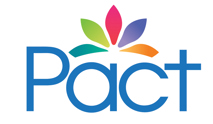06/03/2020
News
Pact in 'Prison' documentary
"The prison believes strengthening family ties is a crucial way to deter reoffending and allows women up to four visits each month."
We were thrilled to see our Family Engagement Manager, Su Benton, feature in Channel 4's documentary 'Prison' this week. The documentary - the third in this series - focused on the importance of strengthening and maintaining family relationships when someone is in prison, and the emotionally charged difficulties of being a mum in prison.
Throughout the documentary we see Su supporting Kelly as she works to reestablish contact with her children...
Kelly's story
When Kelly was sent to HMP Foston Hall, she struggled with anger and managing her emotions. Her ex-partner had decided that her situation was too confusing and unsettling for their children so Kelly hadn't been able to contact them. She was finding it really tough.
Pact’s Family Engagement Manager at HMP Foston Hall is Su. Su supported Kelly as she went before the Family Courts to try to gain access to her children. She was granted phone contact, twice a week, meaning she was able to speak directly to her children, having not heard their voices for 16 months. It is a beautiful moment to watch.
After losing contact with her children and being in prison, Kelly committed to making changes. She took a course in prison which helped her deal with her anger and deal with the violence in her childhood.
“There has to be a time where someone breaks the chain,” said Kelly, during her studies in the prison, “so now I’ve had my two little boys and I’ve never laid a hand on them. I want my kids to have everything that I didn’t, and I never want them to have that fear of who’s coming up the stairs. I want them to feel safe.”
With three months to go, Kelly was granted a home leave, under supervision, to see her children. Having been out of the prison for a day she found it really difficult coming back, and we watch her struggle to adapt to her changing circumstances. Through all of her ups and downs Su is there to support her. Su helped Kelly keep focussed on her children, and continue her anger management course.
In the lead up to her release, Kelly was told by her probation officer that she had to go to a hostel and couldn’t move in with her sister as she had planned. The hostel she was offered was in Bedford which is hundreds of miles away from her home and her boys. Su intervened and helped advocate for Kelly, but also talked her through and helped her understand what her boys needed. Su was able to secure Kelly a place in a hostel much closer to her boys and also worked with the social worker to advocate for contact with her children on release which was granted to her by the Family Court.
An interview with Su
Q: Can you tell us a little bit about who you are and your role in Pact?
A: I'm Su Benton and I am the Family Engagement Manager (FEM) at HMP Foston Hall. I have been a FEM since September 2014. A typical day consists of a few new assessments of new referrals, following up on current cases - contacting family/social workers - getting information so as to update the person I am supporting, providing information/guidance to other prison staff (information on family court orders, rights of prisoners in relation to family matters, safeguarding etc.)
Q: How did you first get involved with the Prison programme?
A: Channel 4 approached me as they had decided, after talking to some of the prisoners, that family was clearly important, and they wanted to focus on that for one of the shows. I decided it was a good opportunity to showcase what Pact does and the importance of Pact's work/support.
Q: What was filming like?
A: I really enjoyed it! I have done other media stuff in the past so I wasn’t too phased by it. They filmed me on and off for hours (must has been over 20 hours). There were at times other people around – some staff tried to make me laugh whilst I was being filmed which meant re-takes had to be done!
Q: Do you think the programme accurately represents your role? How about what life is really like for women in prison?
A: I was pleased with how they represented my role, I think I came across quite serious which is not me at all, but professional and I sounded like I actually knew what I was talking about which is always good! It was interesting to see other parts of the show and how the women are in prison as I often don’t see this. I think it showed that the women do have support and options if they choose to take them.
Q: What were the best and worst bits about taking part?
A: The best was that it reminded me why I do the job and the impact I have on the women’s and families lives, and how rewarding it can be. The worst – nothing.

